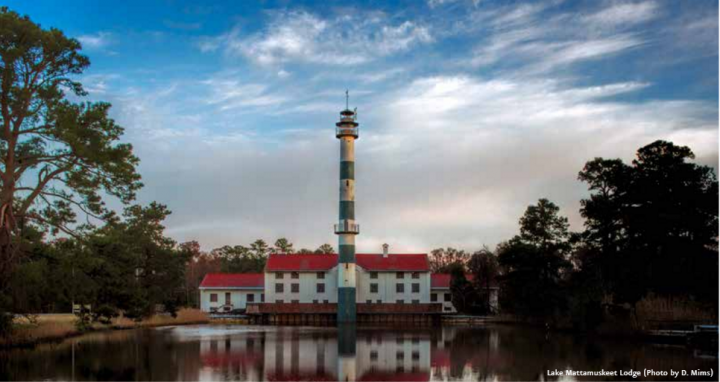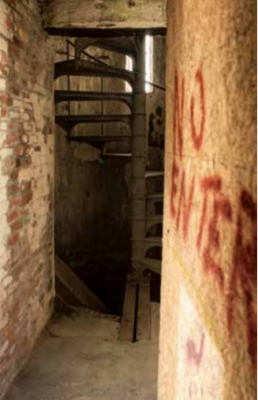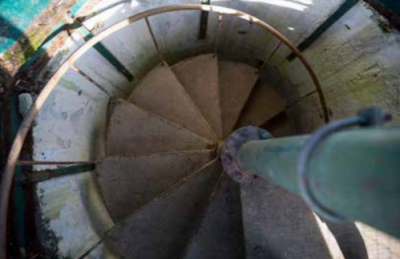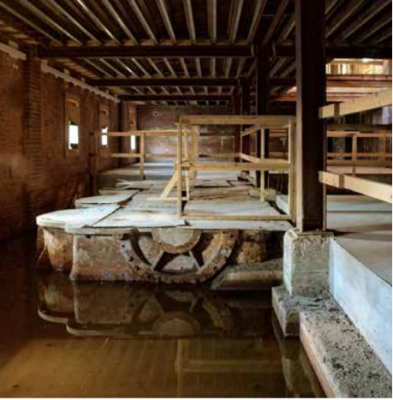
SWAN QUARTER – Expanses of fertile, black farmland, forested swamps, and the state’s largest natural lake have been worthy neighbors to 103-year-old Mattamuskeet Lodge, a handsome centerpiece of cultural distinction for rural Hyde County. But restoration of the state-owned building has languished under budget shortfalls.
The solution may be partnering with private business, according to a report submitted to the state legislature on Jan. 15 by the North Carolina Wildlife Resources Commission.
Supporter Spotlight
The proposal describes plans to complete renovation of the lodge and offer opportunities for private partners to operate the facility. Potential operators could include tour and guide companies that could make the most of the lodge’s location in premier hunting and fishing grounds.
“We’ve had input along the way from local partners, but that is not in any way a predetermination,” Gordon Myers, the commission’s executive director, said in a telephone interview last week.
Whatever the partnership may entail, he said, it is not intended to compete with area inns and restaurants.
“Certainly, from an economic development perspective, the goal is to lift everybody up,” Myers said. “And certainly, we don’t want to do anything to impact local businesses.”
According to the report, about $8 million is needed to finish the restoration, which was partially done in the mid-2000s. But a business plan done in 2008 by tourism experts showed that that annual costs for the state to operate the lodge would exceed the income. In that light, a public-private partnership could integrate businesses into a “hub” model that fosters traditional uses of the building. Revenue could be generated not just by the services provided, but also by licensing and marketing the Mattamuskeet brand. The lodge would have 14 “simple but refined” guest rooms, a dining room featuring local seafood and farm products, and common areas for people “to connect with the rich natural and cultural identity of the region.”
Supporter Spotlight
Myers said that after the report is reviewed by legislators, he expects that the commission will hold public meetings to get feedback on a proposal. Once more information is nailed down, the project will be put out for competitive bids.
No specific plan has been determined on capital financing at this point, Myers said.
“We have a fair amount of work to do,” he said. “We have additional ground-truthing to go through … before we put out a RFP (Request for Proposals).”
Originally the world’s largest pump station and later a renowned hunting lodge, the lodge has historic significance on a state and national level. But to Hyde County residents, the lodge goes beyond the agricultural and hunting richness of the area. It is where generations of the community have worked and gathered. It is where their daughters were married, where their children went to the prom and where big community celebrations were held. With its 12-story-tall striped tower standing midway in front of a formidable white, red-roofed building, the lodge is a potent symbol of Hyde’s unique history. A picture of the lodge reflected in the still canal waters is one of the most iconic Hyde County images.

State officials and dozens of legislators and their spouses met for a transportation meeting in January of last year in Hyde County and were given a tour of the incomplete lodge, said county manager Bill Rich. Another meeting of state officials was held again in Hyde this past January, which included a presentation on the proposed public-private partnership for the lodge.
“The lodge is a treasure,” Rich said. “And for it to sit there half dressed is almost criminal.”
Running the lodge is expected to be more of a “labor of love” than a profitable venture, Rich said. It is the peripheral connection to Mattamuskeet that can be marketed and create revenue.
“Somebody’s going to have to create branding because the lodge can’t support itself,” he said. “We’re branding the concept of Mattamuskeet. That needs to be branded however it can be branded.”
Rich said that part of the concept being discussed is creating a loop for visitors who travel from Hatteras in Dare County to Ocracoke Island on the ferry. They can then leave the island via the Swan Quarter ferry and spend time in the wilds of mainland Hyde – whether taking photographs, hunting, fishing, or going on a wildlife tour – and stay at the lodge.
“All this is, it starts a snowball effect, he said. “All it does is stimulate everyone’s business.”
With just 5,600 year-round residents in Hyde County – including 900 on Ocracoke Island – the rural county is rich in land, water and natural resources but poor in everything else, especially job opportunities. Farming and fishing are still the main sources of employment on the mainland, with summer tourism on Ocracoke a huge industry.
Visitors to Swan Quarter, the county seat and the town closest to Mattamuskeet, are few and far between, except when the hunting is good in the winter months. During duck and bear season, Rich said, the population of mainland Hyde grows by about 2,000 people. More than 100,000 people visit the refuge every year.
Despite concern expressed by some business owners in the community that the lodge could create unfair competition, Rich said it would instead attract more visitors.
Mattamuskeet is famous for its waterfowl, and northeastern North Carolina is renowned for its plentiful and large black bears.
“It’s unbelievable what people will do to bear hunt,” he said. “They come to Hyde County from all over the world to shoot a bear.”
J.C. Williams, a county native who runs Chris’s Grocery in Swan Quarter, said most the community would be happy just to see the lodge back in business.
“I wish it was open right now,” Williams said. “Anybody can get it going – I don’t care.”
Williams, 66, said when he was growing up there were five stores and three service stations in the town. Today, with just a handful still operating in the area, Williams said that anything that attracts more people is a good thing.
“Now there’s nothing. Nada,” he said. “If you come through Swan Quarter, it’s pitiful. The kids don’t have a thing to do. It’s farm, fish or leave. Or you can work at the prison.”
Lewis Forrest is founder and executive director of Mattamuskeet Foundation, a nonprofit group that supports Mattamuskeet National Wildlife Refuge, where the lodge is located.
But he also takes great interest in restoration of the lodge and preservation of its history.
Forrest, a former educator who lives in Pitt County, by chance acquired 40,000 pages of documents detailing drainage projects done early in the 20th century at the lake.
In 1934, the U.S. government purchased Lake Mattamuskeet and the pumping station. The Civil Conservation Corps converted the building to a hunting lodge and refuge headquarters, and in 1937 opened Mattamuskeet Lodge to the public. The operation closed in 1974.
Troubled History
Never a successful business operation, the engineering behind the pump house was quite the feat.
“It housed the largest capacity pumping plant in the world, then or since,” Forrest said.
It was made to pump 1.2 million gallons a minute – that’s 20,000 gallons a second – but that turned out to be more theoretical than realistic. The facility couldn’t run steam engines at full power, Forrest said, because of the turbulence from the air bubbles created by running all four steam engines.
According to the lodge’s nomination for the National Register of Historic Places, the pump house was originally built in 1915 for the Southern Land Reclamation Co. to drain the lake so its peat-rich bottom could be farmed. When it was designated for listing in 1980, the three-story, 14,977-square-foot plant had been remodeled into a 38-room lodge after the U.S. government acquired the building in 1934. The distinctive chimney of the pumping plant was remade into a 120-foot observation tower with a stairway.
But the nomination makes it clear that the lodge’s current woes are a continuation of Mattamuskeet’s overall difficulties from the start.

“The Lake Mattamuskeet Pumping Plant,” the document said, “stands as a symbol of the troubled history of the Lake Mattamuskeet area – the digging of a network of canals, the building of pumping plants and a model community, the spending of millions of dollars, the bankruptcy of one company after another and the eventual abandonment of the scheme as impractical and too expensive.”
Indeed, 25 years after the lodge was awarded its historic designation, it was in such disrepair that the federal government, in a deal orchestrated about 2006 by Rep. Walter Jones, R-N.C., and then-state Sen. Marc Basnight, D-Dare, agreed to turn over Mattamuskeet Lodge to the state so it could be restored.
As Forrest remembers it, the state funds for the complete restoration had been appropriated. But Basnight, suffering from a progressive illness, retired from the legislature before the lodge project was completed. The restoration funds were subsequently transferred into the state’s general fund and have yet to be re-appropriated.
Forrest said the state should follow through with its promise to restore the lodge, and then turn it over to a nonprofit group to operate it. A private entity, he fears, could change the atmosphere or limit access.
“I’m concerned that they’ll take control of what this will be in the future,” he said. “Probably, the local people will not be able to make use of it.”
A Potential Bidder
Jamin Simmons, a county native and an owner of several farm- and wildlife tour-related businesses, has been providing input on the public-private proposal at no charge to the county and state, he said. Although he may end up bidding on the project, he said, that is not his main objective.
“I just want to see the lodge opened,” he said. “I think it can be an economic hub for the area, not just Hyde County.”
There are currently about five other guide services that work in Hyde, Simmons said, and revitalizing Mattamuskeet Lodge would benefit them and the area’s motels and restaurants.
“They could thrive from this,” Simmons said.

In recent years, Simmons purchased and renovated an old motel-restaurant in Hyde County, renamed the Outpost, to use for his tour and guide business. Before then, the motel hadn’t rented a room in 13 years. Now it employs about 25 people in peak season and contributes to Hyde County’s tiny tax base.
Since 2013, Simmons said his tour business has more than doubled, and he is “pretty much” sold out for 2017. That success speaks to Hyde’s reputation for great hunting and fishing. Mattamuskeet is especially famous for its waterfowl, and even though the number of birds have decreased from the mid-20th century heyday, duck hunting is still excellent.
Simmons suggested that if customers, by way of a questionnaire, could rate guides booked through Mattamuskeet Lodge based on the quality of their service, high-ranking guides would be able to earn valuable “preferred guide” status. Other than perhaps a finders’ fee, Simmons added that he does not envision the lodge charging to promote anyone, but instead, it would involve customers endorsing good service providers.
Although Simmons said he believes that a public-private partnership offers the best chance to make the lodge viable, he said it is important that it not become completely private.
“That’s crucial, too,” he said. “The people have a certain amount of feeling of ownership of that lodge and are very proud of it.”







